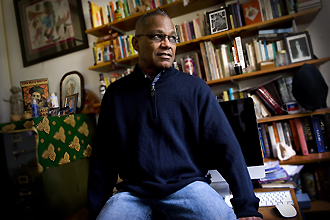Zulu Parade Origins in Musical Theater
The Zulu parade has its origins, not surprisingly, in the streets of New Orleans. But this iconic African American celebration of Mardi Gras did not start out with its members wearing the satirical African “jungle” accoutrements grass skirts, black face and headdresses decorated with bones that Zulu riders wear today, says Felipe Smith, associate professor of English.

Felipe Smith, associate professor of English, explores the New Orleans festival performance culture, focusing on African and Caribbean influences. He is a co-editor of the book, Global Circuits of Blackness. (Photo by Paula Burch-Celentano)
A group called the Tramps was the forerunner of Zulu, Smith says. The Tramps masked and dressed as beggars in ragged clothes as they marched around during Carnival in the early 20th century.
The inspiration for changing their costumes to an African theme and the new name for the Tramps organization came about when the group went to a performance in a lodge hall of a musical comedy by the Smart Set, says Smith.
Smith has written about the genre of early-20th-century black musical theater, including the “Back to Africa” musicals. These “blackface minstrelsy” shows portray black American characters eager to move to Africa to escape from segregated Jim Crow America. Caricatures of African royalty and hence the inspiration for Zulu monarchy are another feature of these popular plays.
“I decided to focus on these musicals because the musicals were ways that the ideas [about migration to Africa and African development projects] disseminated amongst ordinary people,” says Smith. The musical comedies included popular songs whose words and lyrics were printed on song sheets and widely distributed.
Zulu is “one component of New Orleans' performance of African connectedness,” says Smith. “Zulu is one vector but there are other forms of commemoration of African ancestry that are part of the New Orleans festival tradition.”
Smith is a co-editor of Global Circuits of Blackness: Interrogating the African Diaspora (University of Illinois Press, 2010). Stephane Robolin, a 1998 graduate of Tulane, also contributed an essay to the book.
